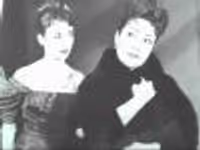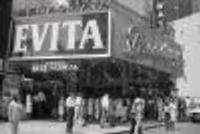What EXACTLY Constitutes a PREVIEW?
#25re: What EXACTLY Constitutes a PREVIEW?
Posted: 3/31/07 at 2:57pm
"Nah. Barbra was only 21 and 3/4 at the time and didn't have that kinda creative clout yet. There were problems with the ending of the show, so it was constantly being worked on. On Opening Night, Barbra and Sydney Chaplin (who played Nicky Arnstein) were rehearsing the 41st version of the final scene as the audience was filling into the Winter Garden Theatre".
Good LORD! That's what you call CLOSE! Did it end the same way the movie ended? You know, it's weird... but I've never noticed the STAGE version anywhere! Gotta be a hard act to follow, no doubt. I love Funny Girl (hell, I even loved Funny LADY), and I thought the ending was so touching (the movie). I hope they didn't have a different ending in the play. Apparently I'm reading some "issues" with the Sweet Chatity tour that's going on now. When we are in San Antonio 9 months ago, Molly Ringwald was in the lead. It's coming to the Dallas Music Hall this summer with Paige Davis (from Trading Spaces). I didn't even know she was an actress!
#26re: What EXACTLY Constitutes a PREVIEW?
Posted: 3/31/07 at 3:02pm
Mymancape has given the correct information regarding this thread. During the "Golden Years" when most previews were out of town, critics did attend the official opening night then rushed up the aisle during the curtain calls to get to their newspaper offices. There were deadlines to be met but Walter Kerr of the New York Herald Tribune and Brooks Atkinson of the NY Times were still able to write well thought out reviews. Now the critics have the luxury of time to write thoughtful reviews. I have a friend who worked for the NY Times and he told me that Frank Rich (Brantley's predecessor at the Times) worked on his reviews for an entire day. He was a tough critic to please, but his reviews were very well written, IMO.
#27re: What EXACTLY Constitutes a PREVIEW?
Posted: 3/31/07 at 3:28pm
As for FUNNY GIRL -- the original stage-ending (which was the Opening Night version) is the same as in the film. The film-version is quite faithful, plot-wise, to the stage-version.
As for Paige Davis...she began her professional career in musical theatre as a dancer.
Here a quick bio:
She recently starred on Broadway as Roxie Hart in the revival of CHICAGO. She also performed in the U.S. National Tour, and the Las Vegas and Portugal productions. Before CHICAGO, Paige played Babette in the 1st National Tour of Broadway's BEAUTY & THE BEAST. Regionally she has appeared as Maria in THE SOUND OF MUSIC at the Pittsburgh Civic Light Opera, Val in A CHORUS LINE at the Austin Musical Theatre, April in COMPANY at the Missouri Repertory Theatre, Irene in HELLO, DOLLY! and Catherine in PIPPIN. She has even toured as a dancer with The Beach Boys! She is currently working on her solo cabaret act, Taking a Chance on Love.

MargoChanning
Broadway Legend Joined: 4/5/04
#28re: What EXACTLY Constitutes a PREVIEW?
Posted: 3/31/07 at 3:39pm
Actually critics typically have several days to work on a review. The first "critics previews" are typically about a week (or sometimes a bit more) before opening night and I know Brantley often goes to the first or second of those giving him nearly a week to write and post his review with the Times. The practice of critics' previews dates back to the early days of Frank Rich's tenure at the Times (around 1981). At the time, critics were still attending opening nights and then rushing back to their papers immediately afterwards and writing and filing their reviews within a couple of hours to make deadline, as they had always done for decades before. Rich loathed the practice and wanted more time in order to be able to write a more thoughtful, well-considered review, so when the next big show came to town and was previewing (I've heard it was AMADEUS), Rich bought a ticket out of his own pocket, attended one of the last previews and based his review on that. Well, it didn't take long for word to get out about what he had done, all hell broke lose with lots of angry producers and press agents accusing the times of sabotage (despite the fact that Rich had written a rave for the show). In short order, everyone calmed down, a deal was struck and shortly after that the "critics preview" was born for every new show. In the beginning, it was just one of the final nights of previews, but has since evolved into a series of nights over the course of the last week. It didn't take much adjustment on the part of individual shows and creative teams, other than shows are now "frozen" well in advance of opening night.
Now, why are preview periods so long?
In the old days (40+ years ago) shows used to have often extensive out of town engagements to work out the kinks, traveling through theaters in Boston, Hartford, New Haven, Providence, Philadelphia and others, getting feedback from critics (including legendary ones like Elliot Norton in Boston who would use his reviews to give advice to the creative team on how to fix their show before the NY critics saw it) and paying audiences, so that by the time they got to New York, they'd usually only need one or two previews -- just to give the actors and stage crew a chance to get used to the requirements of the new theater -- before opening night.
In the last few decades, though, the road became too expensive for extensive pre-Broadway tours, so while a show might play one (or occasionally two) out of town engagements, new shows (and even revivals) have increasingly relied on longer preview periods to fine tune a show before the critics arrive (obviously it's much easier and cheaper to stay in one place and do it here in New York, than having to move theater to theater and have to pay actors, musicians and crew for hotel accomodations, food and per diem in addition to their salaries).
Mind you, really major changes are rarely made during NY previews. It used to be if your creative team needed to write a new scene or new song that required a new set, it was easy enough just to toss out the old flats and paint a few new ones. These days in an era of very expensive multi-million dollar set pieces, and very complicated computerized set and lighting designs, once sets are built, producers are loathe to change them too much. That's why shows spend years in workshops and readings working out kinks and rewriting, so that by the time of the first out of town engagement (or for off-Broadway, by the time previews begin), not much can (or needs to) be changed other than fairly superficial or minor things. That's why when you hear a show is in trouble out of town these days and gets bad reviews (like Lestat or The Times Are A-Changin), it's all but impossible to overhaul and fix it enough to turn it into a hit by the time it gets to New York (which used to happen quite often in the old days).
Anyway, that's part of the reason why preview periods are often a month or more these days and for off-Broadway shows at the institutional not-for-profits, previews often go on longer than the actual post-opening run. In the case of the not-for-profits, it's not necessarily that the show is trouble, but the fact that they have a built-in subscriber base that will give them full or nearly full houses for that first month, so they don't NEED the reviews since the show is pre-sold anyway and so they put off opening night until the show is in tip-top shape (or at least as good as it'll ever be) and by then, if the reviews are good, they can usually extend for a couple of weeks and get the benefit of the critical raves (and in some cases they can even move to Broadway, further benefiting the not-for-profit), and if the reviews are bad, well, the run is almost over anyway, and they can eke out the last week or two without having to worrying too much about half-empty houses due to subscribers staying home or lack of single ticket sales from the general public.
Bottom line, though, 95% of shows don't change THAT much between early previews and opening -- and the performance level is MUCH higher that a "public dress rehearsal" and generally is every bit as good as it would be a month later -- so I generally wouldn't worry about seeing a show in previews as opposed to after opening (and in fact, I almost always see shows before the reviews come out, so I can form my own opinion without having a dozen reviews in the back of my head while I'm watching it). In fact, I can think of several shows that were actually better early in previews (when although the performances were still a little raw, there was the kind of electricity and spontaneity and excitement that mostly disappears a few months later due to repetition and the grind of doing months of 8 shows a week). The original Broadway production of Angels in America is one example (I saw the show many many times and the best performance I ever saw from Marcia Gay Harden and a couple of the others was at the 3rd preview performance).
But, if you're at all concerned about going to a preview and not seeing the FINAL version of the show, then go the last week of previews. By then, the show will be frozen (the critics are coming after all) and you can be sure that (except in extraordinarily rare cases) no more changes will occur.
Dover
Leading Actor Joined: 4/29/06
#29re: What EXACTLY Constitutes a PREVIEW?
Posted: 4/1/07 at 4:10am
Any show that previews for more than about 4 weeks, or one that postpones its opening, is a sign of a show in trouble. My personal favorite is The Red Shoes, which had something like 52 previews and 5 actual performances. Bad news.
A dress rehearsal is a run of the show with tech and costumes. If a show is in decent shape the day before first preview, it will often have an invited dress, where industry folks are invited to see it for free. It gives the company a chance to feel the show with a supportive audience before they face the paying crowds. If the show is good it can also help to start good word of mouth within the industry. It's presented as it would be seen in a real performance, without stops, unless something bad happens. Sometimes the director will come out before the show and say a few words of welcome, or some explanations, like that the Overture won't be orchestrated until tomorrow, so just use your imagination. A show that cancels or does not have an invited dress is sending out signs of trouble, although it doesn't always mean disaster. It's perhaps more fair to say that a show that does have an invited dress is sending out signals that things must be going well.
A preview is different from a dress in the sense that as far as the audience is concerned it's just like a regular performance. The ticket prices are usually full price (although in days past it was more common for previews to be discounted). And it's open to the public through the regular box office as opposed to a dress which is by invitation only and usually general seating.
Updated On: 4/1/07 at 04:10 AM
Videos




